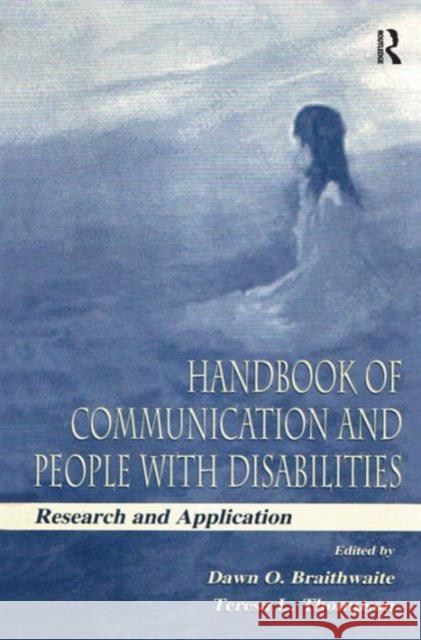Handbook of Communication and People with Disabilities: Research and Application » książka
Handbook of Communication and People with Disabilities: Research and Application
ISBN-13: 9780805830590 / Angielski / Twarda / 1999 / 556 str.
Handbook of Communication and People with Disabilities: Research and Application
ISBN-13: 9780805830590 / Angielski / Twarda / 1999 / 556 str.
(netto: 932,90 VAT: 5%)
Najniższa cena z 30 dni: 881,54
ok. 22 dni roboczych.
Darmowa dostawa!
This "Handbook" represents the first comprehensive collection of research on communication and people with disabilities. The editors have brought together original contributions focusing on the identity, social, and relationship adjustments faced by people with disabilities and those with whom they relate. Essays report on topics across the communication spectrum--interpersonal and relationship issues, people with disabilities in organizational settings, disability and culture, media and technologies, communication issues as they impact specific types of disabilities--and establish a future agenda for communication and disability research. Each chapter provides a state-of-the-art literature review, practical applications of the material, and keywords and discussion questions to facilitate classroom use.
In providing an outlet for current research on communication and disability issues, this unique collection contributes to the lives of people with and without disabilities, helping them to improve their own communication and relationships. Intended for readers in communication, psychology, sociology, rehabilitation, social work, special education, gerontology, and related disciplines, this handbook is certain to augment further theory and research, as well as offer insights for both personal and professional relationships.
This Handbook represents the first comprehensive collection of research on communication and people with disabilities. The editors have brought together original contributions focusing on the identity, social, and relationship adjustments faced by people with disabilities and those with whom they relate. Essays report on topics across the communication spectrum--interpersonal and relationship issues, people with disabilities in organizational settings, disability and culture, media and technologies, communication issues as they impact specific types of disabilities--and establish a future agenda for communication and disability research. Each chapter provides a state-of-the-art literature review, practical applications of the material, and keywords and discussion questions to facilitate classroom use.
In providing an outlet for current research on communication and disability issues, this unique collection contributes to the lives of people with and without disabilities, helping them to improve their own communication and relationships. Intended for readers in communication, psychology, sociology, rehabilitation, social work, special education, gerontology, and related disciplines, this handbook is certain to augment further theory and research, as well as offer insights for both personal and professional relationships.











